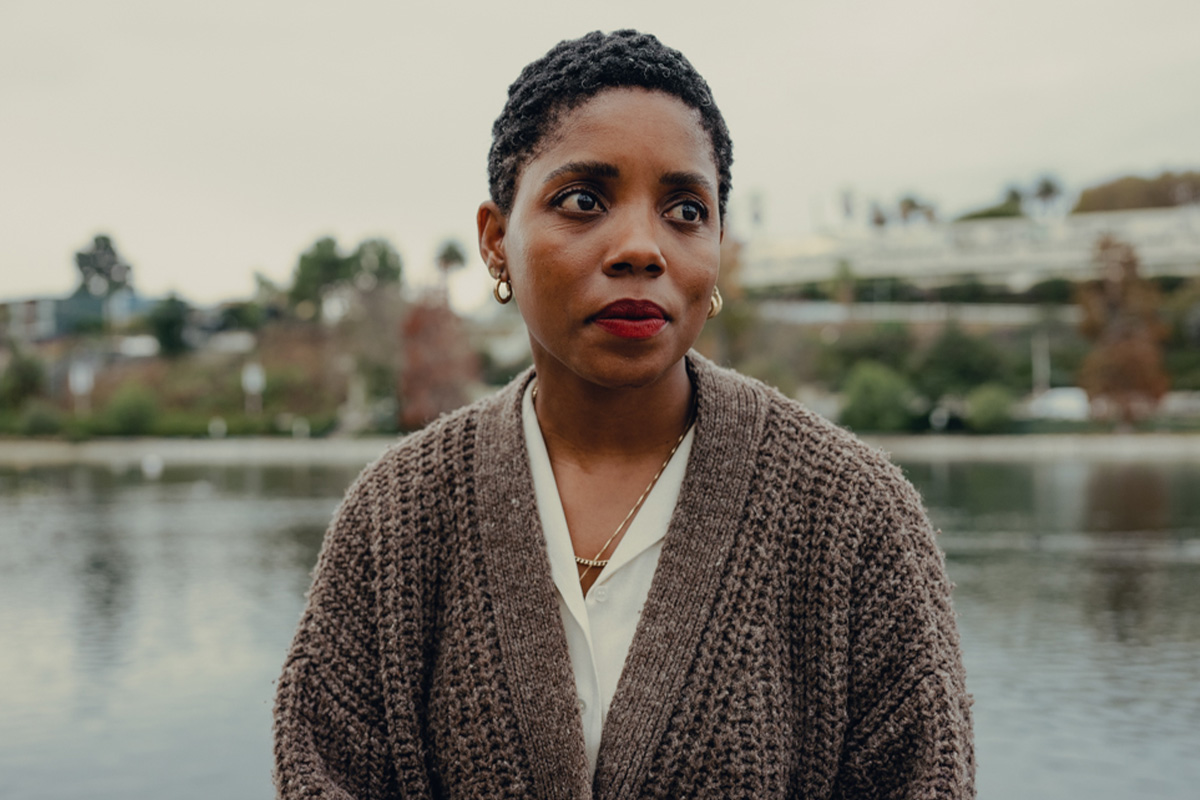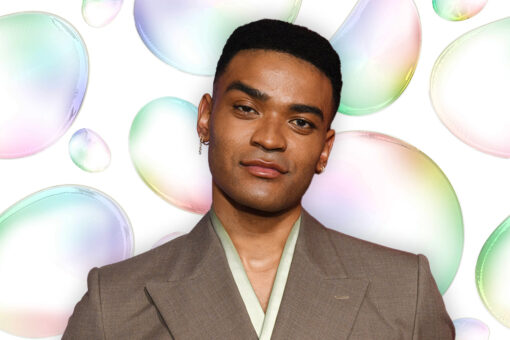When I meet filmmaker Janicza Bravo on Zoom, she is wearing a Star of David around her neck, a gift from her stepfather which she’s had since she was young. “I’m going to Poland on Friday, and I’m probably going to not wear it in Poland, because I’m getting energy,” she says when I inquire about it. “I already have so much going on; I already have to be a Black person with a shaved head. So like, that’s already a lot for Poland, you know?”
Bravo has a long on-again, off-again history with this necklace. While studying abroad in Spain during her senior year at New York University, she wore it until her Spanish boyfriend told her not to. “And he was right, by the way. I was already pulling in a certain kind of attention because of what I looked like. And then suddenly I was adding a Star of David…” She had gone to Madrid hoping to learn more about her Jewishness, which, according to her mother, has Spanish origins. But “[Madrid] was very, very hard, super unwelcoming and very prejudiced — very racist. So that shut that door.”
This dynamic, in which she feels drawn to her Jewishness but burned by each attempt to explore it, appears over and over in my conversation with the director, who has made seven shorts and two features, her most recent being last summer’s stylish, hilarious and heartbreaking “Zola.” Adapted from a Twitter thread, it’s as much about perspective and the nature of telling as it is about the events themselves. It now leads the Independent Spirit Awards nominations with seven nods (if you haven’t seen it, stop reading and go watch!).
The first Bravo work I encountered, a singular short film called “Gregory Go Boom” which won the Sundance Grand Jury Prize in 2014, stars Michael Cera as a wheelchair-bound character unlike any I’d seen before: foul-mouthed and determined to change how the world perceives him. In her first feature, an uncomfortable dark comedy called “Lemon,” Brett Gelman (her then-husband who also co-wrote the film) plays Isaac Lachmann, a Jewish actor who dreamed of greatness and now does ads for hepatitis-C medication. To give a sense of the movie’s tone: When we meet Isaac, he’s pissing himself.
“Lemon” is Bravo’s most Jewish work to date. One excruciating sequence takes place at a Passover seder populated by familiar-feeling Jewish characters — parents who micromanage (in order to avoid back injuries and wall scratches) as Isaac helps them move a table, for instance. Each member of the family seems somehow dysfunctional: Isaac; his pregnant sister Ruthie (Shiri Appleby) and her young Black son Henry (Blake Crawford); his religiously observant brother Adam (Martin Starr), who brings his two identically-dressed daughters and depressed wife; the family friend whose wife has left him (David Paymer).
The latent awkwardness comes to a head when Henry, as the youngest, is asked to recite the Four Questions. This devolves into a nails-on-a-chalkboard argument between Ruthie and Adam about whether Henry is “necessarily Jewish.”
“Passover is about the Jewish people… the Jews escaping tyranny and oppression,” Adam says. “Blacks don’t know anything about that,” retorts Ruthie, sarcastically, before sending Henry’s babysitter Rosa (a Latina woman of color) into the kitchen for some more sparkling water. The gathering then moves into the well-appointed living room, where African art adorns the walls, and the family sings a group rendition of “A Million Matzah Balls” on the piano.
Around the release of “Zola,” the mixed critical reception that “Lemon” received came up in a New York Times interview with Bravo: “One critic implied that Bravo was toying with antisemitic stereotypes, which amused Bravo because she believes they assumed she wasn’t Jewish (she is). ‘Not that Jewish people can’t be antisemitic, but I think the critic just couldn’t imagine my proximity to this world,’ she said. ‘I think people felt I was treading in territory that wasn’t mine to tread.’”
Bravo was born in New York and grew up in Panama until she was 12. Her mother and stepfather, like many Panamanians, were Catholic; her family went to church and had friends who practiced santeria. She first learned that her mother’s mother was Jewish from a photograph, shown to her around age 11, of a “mixed family, white and Black, on a farm in Jamaica.” Her grandmother, the only one who could have answered her questions, had recently passed away. Bravo grew interested in her Jewishness — but she didn’t always feel that it was interested in her.
She moved to Crown Heights, Brooklyn as a preteen, a neighborhood which is “half very Caribbean and half super Hasidic, and they’re parts that really rub right into each other,” around “the height of tension between these communities.” While there, she “went to a temple and had a very curious experience of not feeling very welcome in that space.” So her desire to connect with her Judaism “went away again.”
It didn’t re-emerge until NYU, where she made American Jewish friends, including filmmaker and “best friend” Brian Savelson, who’s still a Bravo collaborator. (Their upcoming TV series “will follow an unreliable narrator who nurses brain tumors he does not have and mourns family members who are not dead while preying on people’s sympathy to get away with almost anything.”) In Bravo’s words, this new community taught her “the humor of stereotypes,” that certain names and faces “seemed” Jewish. They invited her to her first seder.
She went on a Birthright trip to Israel and was totally sold at first, thinking, “OK, I’m gonna make aliyah, it’s over. This is my life now. Fuck America, I’m done, I’m never returning.” But then on day five, she suddenly asked herself, “Wait a minute, what’s happening?” For her, this relates to her perceived inability to be a good cult member, despite her fascination with them: “Am I just two brain switches away from removing myself from my whole community, my whole life, because this is the thing that makes sense to me? But I think I ask too many questions and I’m kicked out too early.” It didn’t help that the other members of her trip maybe “thought [she] was a scammer,” faking Jewish heritage for a free trip. “For every day that I was there, one person asked me to explain myself to them because they had never met a Black Jewish person. [Towards the end of the trip], we met some Ethiopian Jews. And then they were like, ‘Oh, there are Black Jews,’ and suddenly that validated my existence. But I’m not Ethiopian… I just wanted to find out about myself, and it really turned me off having to, every day, do a drill around my background and why I deserved to be there. I found myself repelled a little bit.”
Her push-pull rapport with Judaism continued in her 20s, when, again, she shared a neighborhood with an Orthodox community — this time in Williamsburg, Brooklyn. (She lived near a synagogue when she moved to LA, too.) The public pool had women’s-only swim on Friday mornings. “It was me and all these Hasidic women. And I was the only person that looked like me. Most of them didn’t swim — they just kind of gabbed in the pool. And they were super fascinated by the fact that I had a shaved head: Why was I electing to have one? A couple of ladies would talk to me a bit more, but most of them were not about it. There was a line in the sand. And I think at that time, I used to wear a Star of David. Some people asked questions, and most people didn’t.”
When she got together with a Jewish man — Brett Gelman, with whom she is still good friends — Bravo “was so excited to be able to have this relationship to Jewishness that I’ve been so hungry for. But he’s not very religious or practicing and his family isn’t either. And I was like, Guys, I thought this was my ticket. You were going to train me, you were going to show me the ropes, we were going to have a temple… and then it was like, oh, yeah, that’s not how we’re vibing. And I was like, damn it.”
Bravo and Gelman made “Lemon” while married, and she didn’t anticipate that some would criticize it on the basis that it wasn’t her story to tell — because she really felt it was. “Brett and I were worried that we were going to wake up one day literally covered in piss, having not arrived at the life that we had seen for ourselves. We were going to look back and [see] so much muck behind us that there was no way of fixing it. In some witchcraft, you write [something] down, and then you burn it, and then that means it doesn’t happen. So it was something like that: We had to put it all in there, make fun of ourselves and know that it wasn’t going to be our destiny.”
She also takes issue with the way that the increasingly discussed question — who gets to tell what story — gets asked. “There’s a whole world of white guys getting to tell whatever they want. Didn’t Steven Spielberg direct ‘The Color Purple?’ Why is that his story to tell? No shade on Steven Spielberg — great. But that’s one example of a multitude of other stories. So it was fascinating to me that ‘Lemon’ wasn’t my story to tell — and I’d heard this about the other work that I was making, too, because the characters at the center were white. There was this question of, ‘Why are you telling these white stories?’ — which I had not perceived as white stories; there were white actors playing those parts, but I didn’t think they were white stories.
“Here I was, a Black woman in my 30s making this movie about a failing white guy. And most of the people writing about movies are white guys who are probably having their own anxieties around failing. I think there was an audacity to me having that conversation. People thought it was about them.”
“Zola” has brought people back to “Lemon” with a sharpened ability to understand Bravo’s visual language. But Bravo thinks “Lemon” plays differently not only because of her sophomore success: “America has had a racial reckoning where they decided that Black people are people and so maybe people can just like, acknowledge that I’m a whole person on the Earth now. I mean, people had to die for me to become a full person in their eyes but, you know, we’re here now.”
Though Bravo is visibly Black, she grew up in a household that “didn’t identify with American Blackness specifically. And I just found that, when I moved to LA in my 30s, that was the space that I’ve ultimately felt the most welcomed in, the space that I’ve been allowed to flourish inside of the most. I think it’s because it’s an easier space for me to be in. And as I’ve gotten older, I have — not shed, but put away a little bit of some of my other identities because there’s too much effort in wanting to claim those.” Her Jewishness now “feels far in some ways.” She’s “curious, but not delving.”
In Alma’s annual pop culture awards, Bravo was named best Jewish director of 5781. When we contacted her, she was “kind of surprised. It came within the same two-week window that something kind of similar came from a Latin award. I was like, oh, these are funny to me, because I’ve been these things for quite some time, but I have not been accepted. What’s my feeling on being seen now? Of course, I’m aware that with having some degree of success comes more awareness. But I can’t help but ask,” she says to me, candidly, “did you know I was there before? Why wasn’t I accepted before, and why am I being accepted now?”
It’s a good question, and I don’t have a neat answer. What I do have is admiration for Bravo’s clarity of sight, her capacity to interrogate what others might accept — you know, the thing that made her ask this, that would make her a bad cult member, and that also makes her an original filmmaker who consistently avoids cliché.
When I ask if Bravo considers her art Jewish, she says she’s curious to hear my opinion; she doesn’t feel in a position to judge. I try to think like she does, to examine assumptions: Does Jewishness, or Jewish art, have inherent qualities, or does it just encompass a lot of very different people who all happen to be Jews? Bravo sees overlap in her Jewish crew, “but we’re also artists. We’re also traumatized. Most of us were born in the ‘80s. Our parents smoked cigarettes while they were pregnant with us. I don’t know that we took to breast milk. So I don’t know? There might be other reasons why we have connective tissue.”
If there is such a thing as Jewish art, I find many of its qualities in Bravo’s work. She recently directed the pilot of a TV adaptation of “Kindred” by Octavia Butler. That story has obvious roots in Black American history: It follows a young Black woman in Los Angeles who “finds herself being pulled back and forth in time to an 1800s plantation to which her family is intimately linked.” But this interest in lost lineages, and connection to the pain of one’s ancestors, feels Jewish, too — and Bravo very much wants to know more about where she came from. She has a fantasy she’ll be approached by the PBS show “Finding Your Roots.” “I want a team of people doing the work that are experts in this area. I want to be successful enough to be an interesting candidate on the show — because I try, but I don’t have enough.”
There is one note in Bravo’s work that rings more Jewish to me than any other: finding the humor in trauma. Her films live at that intersection. She told the Times’ Jenna Wortham that “the keys [Zola] is playing, those are my keys — where trauma and humor meet… All of my work leading up to it was already playing that music.” Throughout “Zola,” which gets wilder by the minute, Zola observes. She has an incredible capacity for detachment and catalogues precise details, tracking what she learned when; she gets through the ordeal in part by figuring out how she’ll make a compelling, hilarious narrative of it someday. It is a kind of superpower, one that Bravo also possesses. She knew she was the best director for “Zola” because “when I read that story, I was like, this is a traumatized woman who used the power of the pen and the power of her humor to recontextualize that which changed her.”
Of course, Jews aren’t the only marginalized people to use storytelling as a means of survival. But as she talks about coping by laughing — about actually changing what happened, and finding resilience, in the recounting — Bravo calls it Jewish, too.
“A way to deal inside of great distress is humor. And I feel the work is very much a product of the world that I have inherited. The world treats me a certain kind of way that tends to give me a good deal of anxiety or make me uncomfortable. And so the work that I am putting out there is a product of the discomfort, the anxiety, the lack of belief, all of those things.
“What I’m presenting is not foreign. It’s exactly how I am moving through this space, but applied to another character. I was always a kid who made shit up, who always retracted and added. I have a pretty rich imagination — to the point of sometimes not remembering how something really was actually, because I’ve told it and retold it, depending on the audience. If the audience in front of me is mostly women, I’m going to tell it a certain way; if the audience is mostly Black, I’m going to tell it a certain way; if the audience is mostly male, I’m going to tell it a certain way.
“And so then somewhere in there, I’ve noticed that I have lost some sense of what was real, because I’ve told and retold some of my own stories so often that I have to work to find what really happened. This is survival. This is survival as women, as Jews, as people of color. It’s how we make it.”



